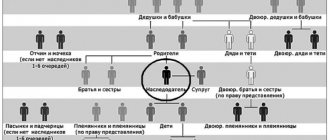If the testator is alive, but is not of sound mind and good health
According to the law, all conversations about inheritance can only be conducted after the death of the owner.
However, there are situations when the owner of the property is still alive, moreover, even rewrote the will, but something makes you doubt that he did it voluntarily or in complete clarity of mind.
Interested parties can restore the previous version of the will document by challenging it in court.
It should be taken into account that in the eyes of the law, it is the last variation of the will that will be considered valid - until the court finds otherwise. This is the “otherwise” thing that will need to be proven.
The servants of Themis do not care at all how eloquently you assert that the sick uncle did not rewrite the fate of the property of his own free will. They will only believe evidence. Add here the fact that judges, in principle, are distrustful of those challenging unilateral transactions - after all, in their eyes it looks like “take it away from him and give it to us.”
Therefore, you need to take on this matter only with the support of an experienced inheritance lawyer.
What kind of evidence could this be?
- Testimony of witnesses (doctors, nurses, social workers, those who entered the owner’s house);
- materials of private detective investigation;
- photo and video materials;
- correspondence (including electronic);
- medical certificates;
- expert opinions.
According to Article 1131 of the Civil Code, such a claim can be filed by:
- relatives of the testator;
- applicants by law;
- heirs under the previous version of the will;
- prosecutor's office;
- other government bodies (the state is also an interested party).
Documents are submitted to the district court at the location of the defendant (Article 131 of the Civil Procedure Code of the Russian Federation), in addition to evidence and the claim, you will need to submit passports of the persons involved and a state duty receipt (Article 333.19 of the Tax Code).
How to restore a lost will, what needs to be done for this
To do this, you need to collect a package of documents and submit them to the relevant authorities within a certain period. Further in the article the procedure for restoring a lost will will be discussed in detail.
Another possible option for them to search for a will may be a request to the Unified Notary Information System. You can access such an electronic database either independently or with the help of a notary. To be able to find a lost will, the heir needs to prepare documents that confirm family ties with the testator, a passport and a death certificate.
In the Unified Information System you can obtain the following information:
- probate register number;
- the date on which the will was made;
- information about the testator.
An application is a document that has legal force and has no expiration date. But, the period during which you can enter into inheritance rights is limited. It is six months from the date of death of the testator.
If the heirs cannot find the will, they need to begin searching or restoring it as quickly as possible.
The completed application can be kept by both the testator and the trustee. In the first case, there is a risk that after the death of the testator, his heirs may not find the will on their own or may not even know about the existence of such a document. It is possible that the testator will lose the will during his lifetime and will not have time to restore it.
Without the original of this document, the inheritance will be distributed according to the law between the heirs of the first stage, the second and so on. The order of heirs is prescribed in Art. 1142 of the Civil Code of the Russian Federation.
If the heir under the will does not belong to the first or second line of relatives, he is automatically deprived of the opportunity to claim his rights to the inheritance. He has only six months to restore the lost will.
Duplicate will
If the will has been lost, you can request that a duplicate be created. This document is created in two copies. One is kept by the person who is the owner of the property, and the other by the notary with whom he compiled it.
According to Article 52 of the Fundamentals of the Legislation of the Russian Federation on notaries, you can contact a notary with a request to create a duplicate of a lost will.
It is worth considering that this can only be done by the notary with whom the will was drawn up.
If the will has been lost, the following persons have the right to submit an application for its restoration:
- the one who made the will;
- trustee of the testator;
- heirs who claim property according to the will;
- executor of the will;
- an heir who has been refused a will.
Representatives of government agencies also have the opportunity to submit a request for a duplicate of a lost will. For example, they may be granted such a right if they defend the rights of a low-income heir.
The procedure for restoring a will is as follows:
- it is worth making sure that the original will cannot be found;
- contact the local Notary Chamber or submit an application to the notary office at the place of residence of the testator;
- find out the address of the location of the will;
- write an application for a duplicate application;
- receive a copy of the will and declare your rights to part of the inheritance based on this document.
In the application to create a duplicate will, you must indicate the following information:
- name of the notary agency;
- information about who is submitting the application;
- document's name;
- the reason for petition;
- date of application and signature of the applicant.
While the testator is alive, no one has the right to dispose of his property without his consent. Moreover, he can draw up a completely new will with different conditions.
But such actions are not always carried out solely at the testator’s own will.
Relatives may doubt that the new will was drawn up with sound mind, full legal capacity and at the testator’s own will. In this case, they have the opportunity to:
- restore the first version of the will;
- challenge the new will in court.
In order to apply for reinstatement and receive a positive claim from judicial officials, solid reasons must be presented for this. In this case, the following situations may become evidence:
- medical reports, certificates from the PND;
- audio, photo or video materials;
- information received from detectives;
- expert opinions;
- witness statements.
Consequences of losing a document
In fact, the loss of a will is not a problem, since the notary always keeps a second copy. But to obtain it, you must contact the same notary with whom the will was drawn up. Of course, these actions can only be done if a notary can be found, otherwise the consequences may not be the most welcoming. After all, without having a copy of the will in hand, it will be difficult for the heir to enter into an inheritance.
Then you will have to sue the heirs according to the law and prove that there was a will.
This is interesting: Will taxation of apartment 2021
Graduated with honors from the Faculty of Law. Since 2006, she has specialized in controversial issues related to inheritance and donation.
How to restore a will if it is lost: paperwork
- Coordinates of the notary office where the will was drawn up
- Address of the local notary office
- Documents proving relationship with the testator
- Death certificate
- Lawsuit
Receiving an inheritance from someone, especially if it is large, in the form of a significant sum of money or housing, would certainly be pleasant for everyone, regardless of whether it came from a relative or a person not related by blood. Some people often learn about an impending surprise of this kind during the lifetime of the potential testator, but after his death, for some reason the document with his last will is not discovered, and the problem arises of how to restore the will if it is lost. In the meantime, there is a fairly simple procedure that eliminates the difficulty of how to obtain a will if it is lost, and can help in most inheritance situations.
Russian legislative realities are such that all wills, in order to legitimize them, certainly pass through the hands of notaries, being certified by them, and representatives of this profession are obliged to keep copies of such documents in their possession. Therefore, if the copy of the paper with his last will that the testator had at home for some reason turns out to be lost (for example, destroyed by selfish relatives who want the inherited property to go to them), it is not difficult to restore it. To achieve such a goal, it will be enough to go to an appointment with the notary who once helped the testator draw up a document indicating the heirs and the share due to them.
It is necessary to act promptly, preferably soon after the funeral of the testator, since, although the state allots exactly six months for declaring rights to valuables that are due as an inheritance, this period can be missed due to all the troubles, and without noticing it. Potential heirs should go to the desired notary office, draw up an application there about the intended entry into an inheritance (this kind of procedure is mandatory regardless of whether inheritance occurs by blood law or by will) and request a will. If the notary keeps everything in perfect order, and besides, people turning to him remember approximately when the document with the last will could have been drawn up, it will not be difficult to find it.
It is also possible that if the will was written down and certified by the now deceased testator quite a long time ago, since then the notary office could change its address, rename, etc. - what about those who found themselves in it? In such cases, you should not despair - you need to go straight to the city or regional notary chamber, where you leave a request regarding the new coordinates of the notary, indicating his previous address and, if necessary, the name of his institution. There are also specialized web portals where you can easily find the necessary address of either the required notary, or at least the local notary chamber, which is available in any large city or regional center.
When the desired notary office is found, there, as mentioned above, you will have to apply there with an application for the desired entry into the inheritance, attaching to it documents about the death of the testator and confirmation of kinship with him. In the case where the potential heir does not have a certificate of the testator’s departure to another world, he must go to the registry office, territorially assigned to the place of registration of the deceased. The registry office usually also requires documents confirming the relationship, but if there are none due to the lack of family ties with the deceased, it is necessary to request the officials to refuse to issue a certificate. A written refusal must also be asked from a notary who does not want to issue a duplicate certificate to a person due to the lack of any documents, and on the basis of these papers a lawsuit must be drawn up demanding the restoration of the heir’s rights according to the will.
How to recover a lost will
Losing the original will, as already mentioned, leads to certain legal consequences. So, for example, if it is impossible to restore and obtain a duplicate, the inheritance will be divided according to the law, and this, as a rule, is not at all what the testator wanted. As a result, the intended successor under the will may be left with nothing.
So, let’s take a closer look at situations where a document is lost before and after the death of the testator.
If the testator is alive
When the testator himself loses his copy of the testamentary act, no problems will arise. He can come to the notary office where the document was originally drawn up and receive a duplicate.
However, going to a notary is not at all necessary. You can draw up a new will, which will replace the lost one. If a new document is drawn up, the old one automatically loses its legitimacy.
You can re-register a will at any notary office. It is not necessary to contact the same place where the lost document was compiled.
If the testator died
If, after the death of the testator, the heirs were unable to discover the will drawn up by him during his lifetime, then there is no need to worry and despair ahead of time. To begin with, you should contact the notary office at the place of residence of the testator or at the location of his real estate.
Even in a situation where the testator himself destroys the document, it will not be considered canceled if the procedure prescribed by law is not followed. The will will have legal force until the testamentary disposition is canceled or changed properly.
Dear readers! We cover standard methods for solving legal problems, but your case may be unique. We will help you find a solution to your problem for free
– simply call our legal consultant at:
+7 (Moscow)
+7 (St. Petersburg)
8 (free call within Russia)
It's fast and! You can also quickly get an answer through the consultant form on the website.
When potential heirs can guess where the testamentary disposition is located, it is worth going there first. In general, this can be absolutely any notary office. However, as a rule, the will is kept by the notary at the last place of residence of the testator or at the location of his real estate.
If the heirs do not know where the will was drawn up and where it is stored, then they must contact the Notary Chamber of the subject of the Russian Federation. This government agency has certain powers and can find the lost document.
To begin investigative actions, you will need to write a statement addressed to the head of the Notary Chamber of your subject of the federation. The heir can do this personally or through a notary who has been in charge of the inheritance case since its opening.
The following documents are attached to the application:
- general passport;
- death certificate of the testator;
- a document confirming the degree of relationship between the applicant and the testator - this can be a marriage certificate, birth certificate or a certificate from the registry office.
Without the listed documents, the search, issuance or restoration of the will will be denied.
Difficulties often arise with documents confirming the degree of relationship. If more than 75 years have passed since the registration of the civil status act, you need to contact the regional archive. If you need to “dig deeper” to prove a family connection, then you should submit an application to the state archive. Information about all civil acts before 1918 is stored there.
Can a previous will be restored?
An inheritance can only be accepted after the death of the testator. As long as a person is alive, he owns and disposes of his property as an owner. It is possible that during his lifetime the testator will draw up a new will, which will change or completely cancel the previous act. It happens that such wills are drawn up for a reason, but under the influence of deception, misrepresentation, clouding of reason.
If relatives realize that something is dirty, they have two options:
- challenge the last will - but you will have to wait, at a minimum, for the death of the testator;
- restore the previous will, which will be the main one.
Challenging a will in court is challenging a unilateral transaction. Objective difficulties arise: the courts rarely meet the plaintiffs halfway, and if they make a decision in their favor, it is only if there are serious arguments.
Evidence may be as follows:
- medical report, certificate from the PND, extract from the testator’s medical record;
- expert opinions;
- witness statements;
- audio, photo and video materials;
- data from private detectives;
- other evidence.
If it turns out that the last will was drawn up under deception, fraud or mercenary intent, the court will invalidate the order. The law establishes that in this case the previous will is valid - it can be found in the register of the notary.
Example:
Dmitry and Oleg knew that their father had left a will, but had no idea about the contents of the document. Turning to the notary, the sons learned that the deceased had signed over all his property to an old acquaintance. Dmitry and Oleg received nothing. The sons already wanted to apply for the obligatory share, but it turned out that the will could be declared invalid. It turned out that an old acquaintance persuaded the testator to transfer the property to him. In return, he forgave him part of the gambling debt and gave him a deferment in repaying the remaining part. The witness was the “heir’s” sister, who told Dmitry and Oleg about everything. The sons hired a lawyer, drew up a statement of claim, challenged the will and declared it invalid on the basis of Art. 1131 Civil Code of the Russian Federation. The father’s last order came into force, according to which Dmitry and Oleg received most of the deceased’s property.
Not many citizens know what to do if they lose a will. Even if you know what to do, there is a high probability of refusal from the notary. Difficulties may also arise when interacting with other heirs - especially if they have connections or involve lawyers. If you intend to defend your rights, contact our experts for help. You can consult on the issue of searching for a will or obtaining a duplicate of it directly on the website. Fill out the feedback form, describe your question or call a lawyer by phone. Together we will find a way out of the situation, and you can restore your will!
- Due to constant changes in legislation, regulations and judicial practice, sometimes we do not have time to update the information on the site
- In 90% of cases, your legal problem is individual, so independent protection of rights and basic options for resolving the situation may often not be suitable and will only lead to a more complicated process!
-free for a lawyer!
Ask a legal question and get a free consultation. We will prepare an answer within 5 minutes!
All data will be transmitted over a secure channel
Fill out the form and a lawyer will contact you within 5 minutes
In order for heirs to receive property due to them after the death of a citizen, they must confirm their right to this inheritance
Therefore, the loss of an important document, especially if it is a will, can cause many problems. What to do if the will is lost, is it possible to restore it, what ways to find and restore it exist if the document is lost by the testator and the intended heirs
All these questions will be discussed in this article.
Contacting a notary
Citizens of the Russian Federation have the right to contact any notary and draw up a will. In exceptional cases, they can do this with persons authorized to certify documents (the head doctor of a hospital or the head of a military unit).
After a person makes a will, filling out a special form for this, a notary certifies it.
In some cases, he can help the testator draw up this document, but this is done only when the person himself cannot fill out the necessary information.
After certification of the paper, the notary gives its original to the testator, and keeps a copy for himself.
In order to draw up a will, you must contact a notary with the following documents:
- testator's passport;
- certificates confirming his ownership of the property indicated in the document;
- a list of heirs and sub-heirs, if any, which should contain their contact information.
Only by providing these papers will the notary be able to confirm the legality of the person’s intentions and certify the will.
Procedure for proclamation of a will
It is generally accepted that a will must be opened on the day of the testator’s death. It is after this that the court decision establishing the fact of the death of the testator comes into force. It must be remembered that the notary does not receive information that his client has passed away. He can only learn about this from the documents provided.
Open
The reading of the will takes place in the presence of a notary. In special cases, the person who certified the document is invited. Sometimes another notary is present and potential heirs have approached him. Of course, this is possible if the original will is in their hands.
After the authorized person verifies that the document is valid, he performs the following actions:
- the circle of heirs under the will is formed;
- a mandatory share is established, which is due to the heirs regardless of the content of the testamentary disposition;
- then the property of the deceased testator is distributed among the main heirs of the first stage;
- after this, the relatives receive a certificate of inheritance.
Closed
They put their own signatures on it. The testamentary document is kept in the notary's office. An authorized person has no right to open a document without permission. Potential heirs must first notify that the testator has died.
Only after this does the countdown to the proclamation of the will begin. After the notary has received news of the death of the testator, he undertakes to announce the last will of the deceased no later than fifteen days later.
The procedure for proclamation of a will by an authorized person involves the performance of certain procedural actions in the presence of at least two witnesses. The opening of an envelope with a closed will is carried out in accordance with the procedure established by paragraph four of Article 1126 of the Civil Code.
The announcement process is as follows:
- heirs provide a death certificate of a relative. In addition, they must show their own identification documents (passports). It is imperative to establish the family ties of potential candidates for the property of the testator and the deceased;
- The notary sets the exact time and date when the will is planned to be announced. He also informs the heirs about the upcoming procedure;
- he announces the exact date and time to all relatives and legal heirs. Notifications must be sent to their place of residence. In some cases, information is published in the media;
- on the appointed day, in the presence of two witnesses, close relatives of the deceased, as well as his heirs or legal representatives, the will is read out;
- if this is necessary, the notary gives precise explanations regarding the content of the documents;
- a protocol is drawn up regarding the fact of the probate of the will, which is signed by the notary and witnesses.
Please note that first the authorized person reads out all the information specified in the first envelope. It contains all the data about the deceased: from first name, last name and patronymic to last place of residence
It is important to list basic information about the witnesses who were present at the time the classified document was read out
An inner envelope with a notary inscription and signatures of witnesses is shown to everyone present. Next, the second envelope is printed. The inner envelope with the will must be opened very carefully. This avoids damage to records and signatures.
The notary must read the last will of the testator. Next, you need to draw up a protocol. For this purpose, the form provided by the Ministry of Justice of the Russian Federation is used. Upon completion of the document, it is read to everyone present.
After this, the authorized person must sign the document. Both witnesses must also do this. Upon completion of this procedure, some information is entered into the registry. The heirs are given notarized copies of the will and protocol.
If the heirs do not want to put their signatures, then the corresponding note must be made in the document.
Legislation
The drawing up of a will, its storage and opening is carried out on the basis of the Civil Code of the Russian Federation. The fifth section of this legal act is devoted to the topic of inheritance.
It covers the following topics:
- general provisions on the concept of “inheritance”;
- inheritance by will;
- obtaining property under the law;
- how an inheritance is acquired;
- How can you obtain certain types of property?
Each article reveals in detail all the nuances that a testator or heir may encounter.
How to recover a lost will
Losing the original will is an unpleasant situation, but quite reparable. What should you do in this case?
Until the death of the testator
If the testator himself discovers that it is missing, he can contact the notary office where the document was drawn up and receive a duplicate. The fact is that a testamentary disposition is drawn up in two copies: one is given to the testator, the second is kept in the notary’s office.
You can do otherwise - draw up a new will, by which the previous one - lost - will be automatically canceled. This can be done at any notary’s office; it is not necessary to contact the exact place where the original testamentary disposition was executed.
After the death of the testator
After my father's death, we did not find in his papers the will that he had drawn up before his death. Is it possible that if it is accidentally lost or deliberately destroyed by the father, the inheritance will take place according to the law? What should the heirs do?
Answer
There is no need to worry about lost or destroyed paper. A will is a notarized document. Even if the testator himself destroyed the document, but did not change or cancel the testamentary disposition in the manner prescribed by law, it retains legal force, even if there is no original, and can be restored in accordance with paragraph 9 of the Rules of notarial records management.
If the heirs know in which notary office the testamentary order was drawn up (and this can be any notary office - without reference to the place of residence of the testator or the location of the property), in order to save time and effort, they can go there - with an application for the issuance of a duplicate.
With the received duplicate, you can go to the notary who is handling the inheritance case, attaching it to the application for acceptance of the inheritance and other documentation.
If the heirs do not know where exactly the testamentary disposition was executed, they should contact the regional, city or district Notary Chamber.
To find a lost will, you need to submit a corresponding application addressed to the President of the Notary Chamber of the region, city or district. The heir can do this personally, or maybe through a notary conducting the inheritance matter.
The following documentation must be attached to the application for searching for a lost will or issuing a duplicate, which is submitted to a notary’s office or the Chamber of Notaries:
- passport;
- death certificate of the testator;
- birth certificate, marriage certificate - to confirm the relationship with the testator.
Without documentation confirming the basis for restoring the will, a notary or an official of the Chamber of Notaries may refuse to search for and issue a duplicate. In case of loss of documentation that confirms a family relationship, you need to contact the civil registry office for a duplicate, certificate or extract from the register (paid service). If more than 75 years have passed since the date of registration of the civil status act, you no longer need to contact the registry office, but the regional archive. Documentation registered before 1918 is stored in the State Archive.
Does it need to be restored?
Let's start with whether it is necessary to carry out the recovery procedure:
- If the testator noticed the loss , but knows that the notary has a second copy, then there is no need to make a duplicate. Since the testator does not need a will, if he suddenly wants to change the heir, then it is enough to simply draw up a new will, which will automatically cancel the old one;
- If the loss was noticed by the presumed heir after the death of the testator, then the situation may develop differently, depending on whether the notary still has a copy of the will, and whether it is known which notary drew it up. If it is known and the copy has been preserved, there will be no problems with receiving an inheritance. If there is no information about who has the second copy of the will, then it will be difficult to obtain the bequeathed inheritance.
What to do if the act was never found?
If the relatives did not cope with the task of finding a disposition or did not want to do this, then the division of property will take place in order of priority according to the law. The procedure is established by Ch. 63 Civil Code. Sometimes applicants refuse benefits altogether or ignore messages about the death of a loved one. Then the values acquire the status of escheat and become state property (Article 1151 of the Civil Code of Russia).
Question:
If the executor lost the will or deliberately destroyed it, will the distribution of things take place in order of priority among the legal heirs?
Answer:
The loss or destruction of paper at the personal whim of the testator does not lead to any legal consequences without recording these actions by a notary. Without an official cancellation of the order, the office will have a current version of the document. According to it, the transfer of values to the beneficiaries will take place.










